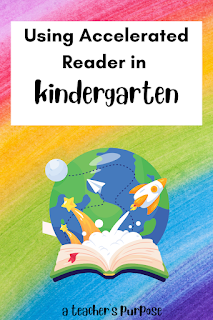I have been using Accelerated Reader (AR) in kindergarten for 20 years. I've read many negative things about AR over the years, mostly things like "AR ruined reading for me." I am confident is saying AR has never ruined reading for anyone, but how the teacher implemented it certainly did. When it is used in a high stress or punitive way, reading will definitely be ruined for the child and probably the teacher, as well. I have seen kids kept in from recess because they are behind on their goal, tests deleted and books mandated to be reread, and kids being boxed into specific levels and punished for reading outside that level. I won't pretend I have never done things like that. But my turning point was about 16 years ago when I was upset a kid was reading below his "level." I scolded, "Kacey! Why are you reading a 1.2?!?!" He looked at me and said, "Because it looked like a good book." He could have slapped me in the face and it would have hurt less. What was I THINKING? What was I DOING to reading? That one comment changed my whole attitude and trajectory as a reading teacher.
My approach to kindergartners in AR is to use it for motivation and feedback. If a kid bombs an AR test, I just say, "That just lets you know you didn't really understand the book," and we talk about ways to help that child comprehend better next time. They never have punishment for AR. NEVER. If they are messing around at reading time, that's different and needs to be addressed in a different way (behavior and not reading).
Setting the Stage for AR success:
Reading TO them: The first few months of school, I read books to the students and have them test on that book. I start by doing several tests with them first, so it is low stress. The biggest reason I use AR for read alouds is to have students become very comfortable with the technology so when they read on their own, the reading and helping with reading are the only priorities and not navigating the technology.
Reading Stamina: A few years ago, I realized I never taught my kids HOW to focus on reading their own books. Kindergarten teachers will relate: you have to explicitly teach every single thing. That includes how to read and building reading stamina (how long they can stay on task). We track our progress daily. The very first time I ever did this: 37 seconds was our time. Once, as a class, we can read about five minutes without kids being distracted, I start having them read for AR.
Books, Books, and More Books: I love books. L.O.V.E. Knowing your books is so KEY. I can look at a kid and a book and know it's a good fit without opening the book. That took a lot of time (remember, I have done this for 20 years in the same class, building the library a few books at a time). My library is overflowing with books so kids have great books to choose from that pique their interest. Know your books. Don't be afraid to throw a book away if kids hate it or the AR test is way too tricky. I also sometimes change a level if I don't agree with the leveling. For example, one of the pigeon books has words like sensational, morsel, and educational and the level was the third month of first grade. I might just slap a "2.0" sticker on it. It doesn't matter to me if it matches what AR says. I am wild like that.
Some of my favorite AR motivators:
AR Procedure Goals: Each day at the end of AR, I give a smiley face if, as a class, we met that goal (picture below). If they get all smileys, or only one that wasn't a smiley, the whole class gets a Dojo point. It helps them focus on a skill the next time. The "line up for Ms. Hahs" is my best tip. Kindergartners will need a lot of help as they start reading independently. I circulate around the room all the time during AR. If they need me and come to me wherever I am, I am SURROUNDED BY CHILDREN! I have a dedicated line up space for kids who need me. Life. Saver.
Word Count Goals. For January, I have a "900 word club." Anyone who reads 900 words gets to be in the club. That means they write their name on a piece of construction paper. That's it. So simple and they feel so accomplished. Then I move the goal higher each month. Kindergartners LOVE looking at how many words were in their book, which shows with their score. At the end of January, my class of 25 kindergartners read over 32,000 words. There is no curriculum that can ever do as much for kids as that reading does.
Class Collaborative Goals: I do not like competition with reading with winners and losers. So, if kids are rushing through books to test, I might have the goal of 100 100's. I put a blank hundred chart and for every 100% a student gets they color in a square. When the class gets to 100, we do a small reward like a movie or extra recess.
This is just part of what goes into my AR life in kindergarten. But, I KNOW, beyond a shadow of a doubt, that this time and work is what makes my class amazing readers, often averaging high first grade level at the end of the year. But way more important than that, is they love reading. And that is the biggest win of all.



